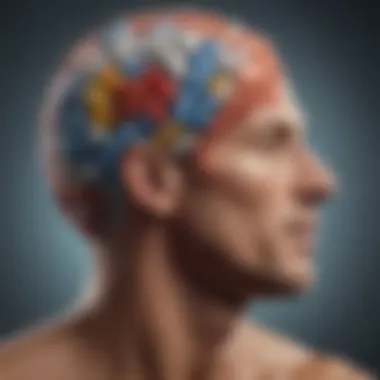The Impact of Antidepressants on Mental and Physical Health


Intro
Antidepressants play a significant role in mental health treatment. These medications can influence neurotransmitter systems, which are crucial in regulating mood, anxiety, and overall mental wellness. Patients often turn to these drugs when they experience severe depressive episodes or anxiety disorders. Understanding the effects of antidepressants is vital for health professionals, wellness coaches, and anyone involved in mental health care.
Research shows that while effective, antidepressants can also lead to a variety of physiological and psychological reactions. This article aims to dissect both the positive outcomes and potential side effects associated with antidepressant use.
Key Takeaways
- Antidepressants alter neurotransmitter levels, particularly serotonin, norepinephrine, and dopamine.
- They can significantly improve symptoms of depression and anxiety disorders.
- Side effects may include weight gain, sexual dysfunction, and gastrointestinal issues.
- Monitoring and adjusting medication is critical for long-term success.
In-Depth Analysis
Understanding Neurotransmitter Interaction
Antidepressants primarily interact with neurotransmitters in the brain. The most common types are selective serotonin reuptake inhibitors (SSRIs) like Fluoxetine (Prozac) and Sertraline (Zoloft). These medications increase serotonin levels, contributing to improved mood and emotional stability. Other classes, such as serotonin-norepinephrine reuptake inhibitors (SNRIs), influence both serotonin and norepinephrine, enhancing energy levels and concentration.
Efficacy on Mental Health Conditions
Numerous studies validate the effectiveness of antidepressants in treating major depressive disorder and anxiety disorders. For instance, a meta-analysis published in The Lancet indicates that antidepressants have a significant advantage over placebo in alleviating symptoms of depression. This underscores their role as a necessary component in comprehensive mental health treatment plans.
Side Effects and Long-Term Use Considerations
While antidepressants can be beneficial, they are not without downsides. The most common side effects include:
- Gastrointestinal disturbances: Such as nausea or diarrhea.
- Sexual dysfunction: Many patients report decreased libido or inability to achieve orgasm.
- Weight gain: A significant concern for many patients taking long-term medication.
These adverse effects compel clinicians to closely monitor patients. Adjustment of dosages or switching to different classes of antidepressants can often mitigate issues. Education on possible side effects is essential for informed patient consent and adherence.
"While the benefits of antidepressants are substantial, fully understanding their complexities is crucial for mental health practitioners."
Culmination
Antidepressants serve as a cornerstone in mental health treatment. Their mechanisms of action, while effective, also necessitate careful consideration of side effects and the need for ongoing patient management. A deeper understanding of how these medications affect the human body can offer valuable insights for health professionals, assuring they provide the best care for their patients.
Foreword to Antidepressants
The study of antidepressants is crucial for understanding mental health treatment. These medications play a significant role in managing conditions like depression and anxiety, helping many individuals lead functional lives. Understanding the fundamentals of antidepressants provides insight into their effects, mechanisms, and the broader context of mental health.
Definition and Purpose
Antidepressants are medications designed to alleviate symptoms of depression and other mood disorders. They work by altering the levels of neurotransmitters in the brain, primarily serotonin, norepinephrine, and dopamine. The purpose of these medications is to correct chemical imbalances, promoting emotional stability. This adjustment can restore functionality and improve the quality of life for individuals suffering from significant mental distress. However, it is essential to recognize that these medications do not provide a cure but rather serve as a therapeutic aid in conjunction with other treatment modalities.
Types of Antidepressants
There are several types of antidepressants, each with distinct mechanisms of action and specific clinical applications. Understanding the different classes can guide healthcare professionals in selecting the most appropriate treatment for their patients.
Selective Serotonin Reuptake Inhibitors (SSRIs)
SSRIs are among the most prescribed class of antidepressants. They specifically target serotonin reuptake, increasing its availability in the synaptic cleft. This mechanism is particularly beneficial for treating major depressive disorder and various anxiety disorders. The key characteristic of SSRIs is their favorable side effect profile compared to older medications, making them a popular initial choice. While effective for many, SSRIs can sometimes cause gastrointestinal upset or insomnia in some patients.
Serotonin and Norepinephrine Reuptake Inhibitors (SNRIs)


SNRIs expand on the action of SSRIs by also inhibiting the reuptake of norepinephrine. This dual action may enhance their effectiveness for certain conditions, particularly chronic pain and depression. The versatility of SNRIs allows them to be used for broader therapeutic purposes. However, this class can lead to increased blood pressure in some individuals, necessitating careful monitoring.
Tricyclic Antidepressants (TCAs)
TCAs are older antidepressants that work on norepinephrine and serotonin reuptake as well, though their side effect profile is less favorable. These medications can be effective, particularly when newer treatments fail. The hallmark feature of TCAs includes their sedative effects, which might benefit those with insomnia. However, side effects, such as weight gain and dry mouth, are more common, limiting their widespread use in modern practice.
Monoamine Oxidase Inhibitors (MAOIs)
MAOIs function by inhibiting the enzyme responsible for breaking down neurotransmitters like serotonin and norepinephrine. This class is effective for treatment-resistant depression but requires dietary restrictions to avoid potentially life-threatening hypertensive crises caused by tyramine-rich foods. While MAOIs can be very effective, the unique dietary considerations make them a less common choice in clinical settings.
Mechanisms of Action
The mechanisms of action for antidepressants are vital to understanding how these medications influence mental well-being. They typically work by altering the levels of neurotransmitters in the brain, which are chemical messengers responsible for communicating between nerve cells. This interaction can lead to significant changes in mood, emotional regulation, and overall mental health stability. Recognizing these mechanisms enables healthcare professionals and patients alike to make informed decisions regarding treatment options. Moreover, comprehending these processes can aid in identifying potential side effects and understanding the need for careful monitoring during medication use.
Neurotransmitter Interaction
Serotonin
Serotonin plays a crucial role in regulating mood, anxiety, and happiness. Low levels of serotonin are often linked to depressive symptoms. Antidepressants, particularly SSRIs like Fluoxetine and Sertraline, specifically target serotonin reuptake, increasing its availability in the synaptic cleft. This enhancement contributes to improved mood and emotional stability, making serotonin a popular focus in antidepressant therapies. However, while increasing serotonin can relieve symptoms for many, it may also lead to side effects such as gastrointestinal disturbances and sexual dysfunction, which need to be addressed by healthcare providers.
Norepinephrine
Norepinephrine is another neurotransmitter implicated in mood regulation and cognitive function. Medications that boost norepinephrine, such as SNRIs like Venlafaxine, can enhance alertness and energy levels. By increasing norepinephrine availability, these drugs can help combat feelings of lethargy often associated with depression. The key characteristic of norepinephrine is its dual role in mood and anxiety management. However, elevated norepinephrine levels may lead to heightened blood pressure or cardiovascular strain, necessitating careful monitoring in patients who have existing health concerns.
Dopamine
Dopamine plays a significant role in the brain's reward system and is associated with motivation and pleasure. Antidepressants that target dopamine, like Bupropion, can help improve motivation and concentration in individuals struggling with major depressive disorder. The important feature of dopamine is its connection to behavior and mood enhancement. Although beneficial for many, the manipulation of dopamine levels can sometimes result in increased restlessness or agitation, which is crucial to discuss when prescribing these medications.
Receptor Modulation
Receptor modulation encompasses how antidepressants influence the receptors in the brain that respond to neurotransmitters. This modulation can lead to long-term changes in how these neurotransmitters affect mood. The precise interaction between antidepressants and their specific receptors, such as serotonin receptors, determines the therapeutic outcomes and side effects experienced by individuals. Understanding this process can clarify why some patients respond well to particular medications while others may struggle, prompting a tailored approach to treatment.
Physiological Effects
Understanding the physiological effects of antidepressants is vital in comprehending their overall impact on mental health and well-being. These medications influence various biological processes in the body, primarily through interaction with neurotransmitters. This section delves into how antidepressants modulate mood, alter sleep patterns, and affect appetite and weight. It underscores the relation between these physiological changes and the therapeutic outcomes observed in patients.
Impact on Mood and Emotion
Antidepressants primarily target mood regulation. Medications like Selective Serotonin Reuptake Inhibitors (SSRIs) aim to increase serotonin levels in the brain. Serotonin is crucial in mood enhancement and emotional stability. By boosting serotonin availability, patients often report a reduction in feelings of sadness and anxiety. This enhancement in mood is not purely chemical; it also fosters a more resilient emotional state.
Moreover, improved mood leads to a more engaged and proactive lifestyle, which can be beneficial in recovery from mental health challenges. A favorable mood can also enhance social interactions and relationships, creating a positive feedback loop. Different types of antidepressants can have varying effects on emotional states, which may require careful monitoring by healthcare professionals to optimize treatment.
Effects on Sleep Patterns
Another significant physiological effect of antidepressants is their influence on sleep patterns. Many individuals suffering from depression experience sleep disorders, such as insomnia or hypersomnia. Antidepressant medications can help regulate these disturbances. For instance, some SSRIs may aid in increasing the total sleep time and improving sleep quality by minimizing nighttime awakenings.
However, the impact on sleep can vary. While some antidepressants promote better sleep, others might cause sleepiness or restlessness as a side effect. This duality requires clinicians to evaluate each patient's specific needs and symptoms carefully. Understanding these nuances can lead to a more tailored approach in managing not only depression but also associated sleep disorders.
Changes in Appetite and Weight
Antidepressants can also lead to significant changes in appetite and weight. The effects vary widely among individuals. Some may experience decreased appetite, while others might have increased cravings for food, leading to weight gain. Medications such as Tricyclic Antidepressants (TCAs) are often associated with weight gain due to their sedative properties and potential to increase appetite.
This area is critical for patient care. Weight changes can affect psychological outcomes, creating additional stress or anxiety for some patients. Healthcare providers must monitor these changes closely and discuss potential strategies to manage weight effectively while still addressing the underlying mental health condition.


"A comprehensive approach to treatment includes monitoring physiological effects alongside psychological outcomes. This promotes overall well-being."
In summary, the physiological effects of antidepressants are multi-faceted. They profoundly influence mood and emotion, sleep quality, and weight management. Recognizing the balance of these effects can lead to a more effective treatment strategy for individuals grappling with mental health issues.
Psychological Effects
The psychological effects of antidepressants are critical for understanding their role in mental health treatment. These medications do not merely modify neurotransmitter levels; they also influence overall mental wellness. Many people rely on antidepressants not just to alleviate symptoms but also to regain a sense of normalcy in their daily lives. The focus on psychological effects helps health professionals gauge the true impact of these medications on a patient’s quality of life.
Anxiety Reduction
One of the significant benefits of antidepressants is their ability to reduce anxiety. Anxiety disorders, which can range from generalized anxiety disorder to panic disorder, often co-occur with depression. Antidepressants, especially selective serotonin reuptake inhibitors (SSRIs) like Fluoxetine and Sertraline, have shown effectiveness in managing these dual conditions.
Patients frequently report a decrease in the frequency and intensity of anxious episodes. This alleviation of anxiety enables individuals to engage more fully in therapeutic practices and to concentrate on recovery. However, it is essential to monitor patients for any worsening of anxiety, particularly during the initial treatment phase.
"Understanding anxiety reduction mechanisms in antidepressants can lead to better treatment plans for those affected by anxiety disorders."
Alterations in Cognition
Another area to consider is the alterations in cognition associated with antidepressant use. Some patients experience improved focus and clarity of thought as their depressive symptoms decrease. However, it is important to note that not all individuals respond positively. Some may experience cognitive side effects such as memory issues or difficulty concentrating.
Research indicates that brain-derived neurotrophic factor (BDNF) levels can increase with effective antidepressant treatment, which has potential implications for cognitive function. The relationship between mental wellness and cognitive function is intricate, requiring careful assessment by health professionals.
Potential Side Effects
The use of antidepressants presents a spectrum of potential side effects that merit thorough discussion. Understanding these side effects is crucial for those considering or currently taking these medications. It can influence medication adherence and overall treatment outcomes. The side effects highlight the complex interactions of these drugs in the body and underscore the importance of tailored treatment strategies.
Common Side Effects
Nausea
Nausea is a commonly reported side effect for many individuals using antidepressants. It can occur shortly after beginning treatment and may subside over time. This aspect is important as it could affect medication compliance. Many people might hesitate to continue their treatment if they experience persistent nausea. The key characteristic of this side effect is its variability; while some people may feel just mildly unsettled, others can face more severe discomfort. Understanding nausea’s contribution to patient experience helps in managing expectations.
Fatigue
Fatigue is another prevalent side effect associated with antidepressant use. It often occurs when patients adjust to the medication. This fatigue can manifest as a lack of energy and motivation, complicating the treatment of depression itself. The unique feature here is how this side effect contrasts with the intended effects of improving mood and emotional stability. While the feeling of tiredness may fade as the body adjusts, it is essential for patients and healthcare providers to monitor it closely.
Dry Mouth
Dry mouth is a side effect that can feel minor but can significantly disrupt daily life. It occurs due to reduced saliva production, which can lead to discomfort and increase the risk of oral health issues. This side effect exemplifies how antidepressants can affect bodily functions beyond mood regulation. Proper hydration and oral hygiene practices can mitigate dry mouth, making it an important topic in patient education. Its impact on quality of life should always be taken into account during treatment.
Serious Side Effects
Suicidal Thoughts
Suicidal thoughts are one of the most serious side effects linked to antidepressants. This aspect raises significant concerns for both individuals taking the medications and healthcare providers. Monitoring mental state becomes critical, especially in the initial stages of treatment or when changing dosages. The key characteristic of this side effect is its potential to surface unexpectedly, emphasizing the need for close observation. This element of antidepressant therapy requires a careful balance between observation and intervention, making it a critical point of discussion in mental health treatment.
Withdrawal Symptoms
Withdrawal symptoms can occur when patients stop taking antidepressants abruptly. This can include various physical and psychological symptoms, which may be uncomfortable and dissuade some individuals from discontinuing their medications. The unique feature of these symptoms is that they can mimic the return of depression, leading to confusion for the patient. Understanding withdrawal symptoms is vital because it emphasizes the importance of a structured discontinuation plan that minimizes discomfort and stabilizes mental health.
It's essential for patients to communicate openly with their healthcare providers about any side effects experienced, as this can lead to more personalized and effective treatment options.


Long-term Use of Antidepressants
Understanding the long-term use of antidepressants carries significant weight in discussing mental health treatment. Antidepressants may provide benefits, but their extended application raises questions about physiological and psychological effects. Evaluating the relevance of long-term antidepressant use is essential for healthcare professionals, as it influences treatment strategies, patient outcomes, and overall health strategies.
Dependence and Tolerance
Dependence and tolerance can develop with prolonged use of antidepressants. Dependence refers to the body's adaptation to the drug, which may lead to withdrawal symptoms if usage is interrupted suddenly. These symptoms can include irritability, flu-like symptoms, and increased anxiety. Tolerance, on the other hand, occurs when the body becomes accustomed to the medication, necessitating higher doses to achieve the same therapeutic effects. These phenomena can complicate treatment, as they may affect the medication's effectiveness and lead to changes in dosages, making it essential to monitor patients closely.
Impact on Brain Function
Long-term use of antidepressants can significantly influence brain function. Research shows that these drugs affect brain neuroplasticity, which is the brain's ability to adapt and rewire itself. For some patients, this leads to improvements in mood and cognitive function. However, others may experience cognitive side effects. Notably, studies suggest that certain groups, particularly older adults, may experience a decline in cognitive abilities.
It is critical for mental health professionals to weigh these impacts when considering long-term antidepressant therapy strategies.
Alternatives to Antidepressants
The search for effective treatments for mental health issues has led many to consider alternatives to traditional antidepressants. This section highlights the importance of exploring different methods that may enhance mental well-being. Not all individuals respond well to antidepressants, and some may experience side effects that can impact their quality of life. Thus, alternatives offer a complementary approach, potentially leading to better outcomes while minimizing risks.
Psychotherapy
Psychotherapy, colloquially known as talk therapy, dives deep into an individual's thought processes, traumas, and emotional struggles. Various types of psychotherapy, such as cognitive behavioral therapy (CBT), psychodynamic therapy, and humanistic therapies, provide frameworks that help individuals articulate feelings and learn coping strategies.
- Cognitive Behavioral Therapy (CBT) focuses on identifying and changing negative thought patterns. It teaches patients practical skills to manage their anxiety or depression effectively.
- Interpersonal Therapy (IPT) emphasizes the improvement of personal relationships and social functioning, which can significantly influence mood and emotional stability.
Benefits of Psychotherapy:
- Encourages individuals to explore personal challenges in a supportive environment.
- Increases self-awareness, leading to better emotional regulation.
- Offers tools and strategies tailored to an individual’s specific needs.
Psychotherapy is not an instantaneous solution. It requires a commitment to ongoing sessions and often works best in combination with other treatments, including lifestyle changes or mindful practices. The goal is to foster resilience and improve mental health over time.
Lifestyle Changes
Making lifestyle changes can profoundly influence mental health. Many individuals may find that altering daily habits can lead to improvements comparable to those experienced with medication. Some potential lifestyle adjustments include:
- Dietary Changes: Consuming a balanced diet rich in omega-3 fatty acids, fruits, and vegetables can nourish the brain and may improve mood. Studies suggest that processing whole foods can positively affect mental health.*
- Regular Exercise: Physical activity promotes the release of endorphins, often referred to as "feel-good" hormones. Engaging in regular exercise can alleviate symptoms of depression and anxiety, providing both physical and mental rewards.
- Mindfulness and Meditation: These practices can help individuals focus on the present moment, reduce stress, and enhance emotional regulation. Mindfulness-based stress reduction techniques are valuable additions to any mental wellness strategy.
Adopting these lifestyle changes often requires an initial investment of time and effort but can yield significant emotional and physical health benefits. Individuals who make these changes may find that they feel more energized, content, and capable of handling life’s challenges.
“Mental wellness is not merely the absence of mental illness; it is a dynamic state of well-being.”
While alternatives to antidepressants are beneficial, it is essential to consult with healthcare professionals before making any significant changes. They can provide insights tailored to the individual’s unique situation. This diversity in treatment methods underscores the evolving understanding of mental health and the need for personalized care.
Ending
The conclusion section summarizes the key insights gained from the article, emphasizing the relevance and complexities of antidepressants in modern mental health treatment. Antidepressants undoubtedly play a vital role in managing mood disorders and aiding many individuals seeking relief from their psychological distress.
Revisiting the Role of Antidepressants
Antidepressants have long been a cornerstone in psychiatric medicine. They provide significant benefits to millions, promoting symptom relief and improving the overall quality of life. Notably, the effectiveness of these medications varies among individuals, highlighting the importance of personalized treatment plans. Each type of antidepressant interacts differently with neurotransmitter systems, which can lead to diverse outcomes. This variability necessitates ongoing research and understanding of patient-specific factors such as genetics, comorbidities, and existing mental health conditions.
Healthcare providers must engage in meaningful conversations with patients about expectations, timelines, and potential side effects. This transparency helps in managing treatment effectively. In addition, it encourages patients to adhere to prescribed regimens, which is crucial for achieving desired outcomes.
Future Directions in Treatment
Looking ahead, research in the field of antidepressants is steadily evolving. Innovations such as genetic testing and advanced imaging techniques are emerging, potentially allowing for more tailored antidepressant therapies. These advancements may enable providers to predict which individuals will respond positively to specific medications, reducing the trial-and-error approach that is often frustrating for both patients and clinicians.
Moreover, as understanding grows regarding the role of neuroinflammation and gut microbiota in depression, future treatments may emerge that go beyond traditional antidepressants. Combining medications with lifestyle changes, psychotherapy, and other complementary modalities could enhance treatment efficacy.
In summary, while antidepressants play a critical role in mental health, the future landscape of treatment holds the promise of more personalized and effective solutions. Collaborative efforts in research, patient engagement, and holistic approaches will be essential for advancing our understanding and treatment of depressive disorders.







